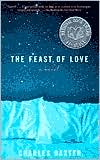
Preview The Feast of Love
You should call it The Feast of Love. I'm the expert on that. I should write that book. Actually, I should be in that book. You should put me into your novel. I'm an expert on love. I've just broken up with my second wife, after all. I'm in an emotional tangle. Maybe I'd shoot myself before the final chapter. Your readers would wonder about the outcome.
But why stop there? Bradley goes on to suggest that he send people to Baxter, "actual people, for a change, like for instance human beings who genuinely exist, and you listen to them for a while. Everybody's got a story, and we'll just start telling you the stories we have"--a sly tip-off to the reader of this elegant, quirky, and wholly engrossing novel that the writer may be no more reliable than his narrators.
What follows is a chronicle of love--the mad kind, the bad kind, and the kind that sustains us when everything else is gone. In addition to Smith, we meet Chloé, a young waitress at Bradley's espresso bar, and her ex-junkie boyfriend, Oscar; Bradley's next door neighbors, Harry Ginsburg, an elderly professor of philosophy, and his wife, Esther; and Kathryn and Diana, Bradley's two ex-wives. The characters take turns narrating, often commenting on and correcting versions of events mentioned by other characters in previous chapters, and occasionally advising Baxter on the progress of his novel: "Don't threaten people, especially lawyers" legal eagle Diana warns "Charlie" shortly before she launches into her own story. "Don't threaten your own characters. It's for your own good. You'll wind up in a mess of litigation and... subplots." But in The Feast of Love, God is in the subplots--Oscar and Chloé's involvement in the porn industry; Esther and Harry's agonized relationship with their mentally ill son; Bradley's travails in love, art, and dog ownership. As the novel progresses, these separate strands gradually merge, and not even an unexpected tragedy can dim the luster of this moonstruck romance. For by the time Baxter brings his tale of love and loss and redemption to a close, his characters have all found their way to the feast--bittersweet though some of the dishes may be. --Alix Wilber
From Publishers WeeklyBaxter (First Light, Harmony of the World, Believers) has for too long been a writer's writer whose books have enjoyed more admirers than sales. Pantheon appears confident that his new novel can be his breakout work. It certainly deserves to be. In a buoyant, eloquent and touching narrative, Baxter breaks rules blithely as he goes along, and the reader's only possible response is to realize how absurd rules can be. Baxter begins, for example, as himself, the author, waking in the middle of the night and going out onto the predawn streets of Ann Arbor (where Baxter in fact lives). Meeting a neighbor, Bradley Smith, with his dog, also called Bradley, he is told the first of the spellbinding stories of love--erotic, wistful, anxious, settled, ecstatic and perverse--that make up the book, woven seamlessly together so they form a virtuosic ensemble performance. The small cast includes Bradley, who runs the local coffee shop called Jitters; Diana, a tough-minded lawyer and customer he unwisely marries after the breakup of his first marriage to dog-phobic Kathryn; Diana's dangerous lover, David; Chloe and Oscar, two much-pierced punksters who are also Jitters people and who enjoy the kind of sensual passion older people warn will never last, but that for them lasts beyond the grave; Oscar's evil and lustful dad; philosophy professor Ginsberg, who pines for his missing and beloved son, Aaron; and Margaret, the black emergency room doctor with whom Bradley eventually finds a kind of peace. The action takes place over an extended period, but such is the magic of Baxter's telling that it seems to be occurring in the author's mind on that one heady midsummer night. His special gift is to catch the exact pitch of a dozen voices in an astutely observed group of contemporary men and women, yet retain an authorial presence capable of the most exquisite shadings of emotion and passion, longing and regret. Some magical things seem to happen, even in Ann Arbor, but the true magic in this luminous book is the seemingly effortless ebb and flow of the author's clear-sighted yet deeply poetic vision. 30,000 first printing; 10-city author tour. (May)
Copyright 2000 Reed Business Information, Inc.
